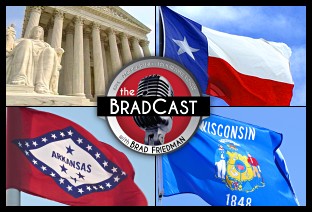 The United States, according to our guest today on The BradCast, lost "the last great conservative Justice" on the U.S. Supreme Court on Tuesday. Justice John Paul Stevens, who lead the liberal wing of SCOTUS before retiring in 2010, passed away on Tuesday at the age of 99 after serving some 35 years on the High Court. IAN MILLHISER, Constitutional law expert, longtime Editor of ThinkProgress Justice and author of the book Injustices: The Supreme Court's History of Comforting the Comfortable and Afflicting the Afflicted joins us today to discuss that loss as well as the rightwing legal challenge seeking to strike down the entirety of the Affordable Care Act. [Audio link to full show is posted below.]
The United States, according to our guest today on The BradCast, lost "the last great conservative Justice" on the U.S. Supreme Court on Tuesday. Justice John Paul Stevens, who lead the liberal wing of SCOTUS before retiring in 2010, passed away on Tuesday at the age of 99 after serving some 35 years on the High Court. IAN MILLHISER, Constitutional law expert, longtime Editor of ThinkProgress Justice and author of the book Injustices: The Supreme Court's History of Comforting the Comfortable and Afflicting the Afflicted joins us today to discuss that loss as well as the rightwing legal challenge seeking to strike down the entirety of the Affordable Care Act. [Audio link to full show is posted below.]
We begin today with a conversation about Stevens' remarkable legacy, and how his tenure was so starkly different from the so-called "conservatives" now seated on the GOP's stolen Supreme Court. Nominated to SCOTUS by Republican President Gerald Ford (after being appointed to the federal bench by Richard Nixon), Stevens, as AP eulogizes, "stood for the freedom and dignity of individuals, be they students or immigrants or prisoners. He acted to limit the death penalty, squelch official prayer in schools, establish gay rights, promote racial equality and preserve legal abortion. He protected the rights of crime suspects and illegal immigrants facing deportation. He influenced fellow justices to give foreign terrorism suspects held for years at the Guantanamo Bay, Cuba, naval base the right to plead for their release in U.S. courts." All positions now seen as "liberal".
And yet, Stevens said during a 2007 interview that he did not think of himself as liberal, but rather as "pretty darn conservative". Millhiser explains how Stevens was able to separate the law from politics, including his own personal preferences, while remaining true to the Constitution and both the rule of law and Court precedent --- all issues which those who call themselves "conservative" today seem to have a difficult time understanding or respecting.
"When he got on the Court, he was widely viewed as a center-right judge. He personally held very, very conservative views. But what made Justice Stevens a great judge was that he knew his political views didn't matter when he was a judge. He knew that regardless of what he thought about minimum wage, or Obamacare, or whatever else, his job was to be faithful to the law and the Constitution," Millhiser tells me. "He was able to set his political views aside and let the law work. And that is all you can ask for in a judge. If we had conservatives like John Paul Stevens right now, who understand that law and politics are separate, we would be in a much better place as a country."
Moreover, as I note at the top of the show, based on my own reporting from 2013, Stevens was willing to admit when he got cases wrong. That year he conceded that his 2008's controlling opinion in Crawford v. Marion County Board of Elections --- the case which approved Indiana's Republican law requiring voters to present Photo ID at the polling place before being allowed to vote --- was ultimately the wrong decision. That SCOTUS opinion has been falsely cited by GOPers across the country as confirmation that Photo ID restriction laws do not suppress legal votes, but help prevent illegal ones. That is both inaccurate and decidedly not what the Court found that case. In 2013, Stevens conceded, "as a matter of actual history," dissenting Justice David Souter was "dead right" in his opposition and warnings about how the precedent would be abused to suppress the vote.
As to the Affordable Care Act (Obamacare) challenge we had originally booked Millhiser to discuss before news of Stevens' passing, oral arguments in Texas v. United States were heard in New Orleans last week before a three-judge panel of the 5th Circuit Court of Appeals. In his coverage for ThinkProgress, Millhiser, who was in the courtroom, describes the hearing before two Republican-appointed judges (one by George W. Bush, the other by Donald Trump) and one Democratic-appointee as a "disaster for Obamacare".
On today's show, he explains the "dumb" and "ridiculous" basis for the case brought by some 20 Republican state Attorneys General --- and now joined by Trump's Dept. of Justice --- and how the challengers specifically filed it in a Texas jurisdiction, a "a kangaroo court", where they knew they could get a favorable ruling from the lower court judge and were likely to get a similar ruling from the rightwing 5th Circuit Court of Appeals. He describes the suit as "the stupidest case I have ever seen", but notes that the appellate court's three-judge panel --- "the two Republicans on this panel were really wacky and behaved in a really partisan way in the oral arguments" --- may ultimately uphold the lower court ruling, at least in part.
Nonetheless he believes the case cannot possibly pass muster at the U.S. Supreme Court given previous rulings on ObamaCare by Chief Justice John Roberts. However, he has a caveat: that prediction only holds if the makeup of the High Court when the case ultimately reaches SCOTUS remains the same as it is today. That, as Millhiser cautions, is not a guarantee. "If Trump gets another vote, all bets are off." And there are ways that both the 5th Circuit and the Republicans challenging the landmark healthcare law could hedge that timing, depending on how quickly they act and how long they delay both the court's decision and any subsequent appeal.
While the basis for this case, he details, is so absurdly thin, that may not mean it will fail, even if, as Millhiser observes, an estimated 24,000 Americans will die each year if the ACA is entirely struck down as plaintiffs seek --- and as the lower court judge already ruled should happen.
Finally, there was a flurry of breaking news coming over the wires as we spoke with Millhiser today, including Democrats in the House scuttling a vote on Articles of Impeachment against Trump; the House voting to hold AG William Barr and Commerce Sec. Wilbur Ross in criminal contempt and MA prosecutors dismissing sex assault charges against actor Kevin Spacey. And then we close today with a few thoughts on the House Dems successful vote on Tuesday for a resolution finding Donald Trump's (legally) racist tweets attacking four freshmen Congresswomen of color were, in fact, racist, and on the 4 Republicans in the 197-seat GOP House caucus willing to vote in favor of that resolution...
(Snail mail support to "Brad Friedman, 7095 Hollywood Blvd., #594 Los Angeles, CA 90028" always welcome too!)
|


 Blowing Smoke.
Blowing Smoke. 'Green News Report' 5/6/25
'Green News Report' 5/6/25
 SCOTUS Allowing Publicly-Funded Religious Schools 'Would be a Ground-Breaking Disaster': 'BradCast' 5/7/25
SCOTUS Allowing Publicly-Funded Religious Schools 'Would be a Ground-Breaking Disaster': 'BradCast' 5/7/25 Trump Judge Blocks NC GOP Attempt to Steal 2024 State Supreme Court Election: 'BradCast' 5/6/25
Trump Judge Blocks NC GOP Attempt to Steal 2024 State Supreme Court Election: 'BradCast' 5/6/25 Prosecutors Resign After Trump U.S. Attny Strikes Deal With Felon Cop: 'BradCast' 5/5/25
Prosecutors Resign After Trump U.S. Attny Strikes Deal With Felon Cop: 'BradCast' 5/5/25 Sunday 'Good Buy, Dolly!' Toons
Sunday 'Good Buy, Dolly!' Toons Trump Losing Streak Continues into SECOND Hundred Days: 'BradCast' 5/1/25
Trump Losing Streak Continues into SECOND Hundred Days: 'BradCast' 5/1/25 'Green News Report' 5/1/25
'Green News Report' 5/1/25 100 Daze: 'BradCast' 4/30/25
100 Daze: 'BradCast' 4/30/25 Campaign to 'Impeach Trump Again' Gains Fresh Momentum: 'BradCast' 4/29/25
Campaign to 'Impeach Trump Again' Gains Fresh Momentum: 'BradCast' 4/29/25 'Green News Report' 4/29/25
'Green News Report' 4/29/25 And Then They Came for the Judges...: 'BradCast' 4/28/25
And Then They Came for the Judges...: 'BradCast' 4/28/25 Sunday 'Desperation' Toons
Sunday 'Desperation' Toons Trump EPA Guts Enviro Justice Office: 'BradCast' 4/24/25
Trump EPA Guts Enviro Justice Office: 'BradCast' 4/24/25 'Green News Report' 4/24/25
'Green News Report' 4/24/25 Sunday
Sunday  Largest U.S. Broad-caster Hoaxes Viewers to Help Gut FCC Rules: 'BradCast' 4/23/25
Largest U.S. Broad-caster Hoaxes Viewers to Help Gut FCC Rules: 'BradCast' 4/23/25 FCC on Precipice of Ending All Limits on Corp. Control of Local TV Stations
FCC on Precipice of Ending All Limits on Corp. Control of Local TV Stations GOP Earth Day 2025 Hypocrisies and Dilemmas: 'BradCast' 4/22/25
GOP Earth Day 2025 Hypocrisies and Dilemmas: 'BradCast' 4/22/25 Pope Francis Dies, Trump Still Alive and Criming: 'BradCast' 4/21/25
Pope Francis Dies, Trump Still Alive and Criming: 'BradCast' 4/21/25 Soc. Sec. Expert Warns DOGE of Collapse, Privatization: 'BradCast' 4/10/2025
Soc. Sec. Expert Warns DOGE of Collapse, Privatization: 'BradCast' 4/10/2025 Trump Blinks, Chaos Reigns, Markets Spike Amid Tariff 'Pause': 'BradCast' 4/9/25
Trump Blinks, Chaos Reigns, Markets Spike Amid Tariff 'Pause': 'BradCast' 4/9/25 SCOTUS Deportation Ruling Grimmer Than First Appears: 'BradCast' 4/8/25
SCOTUS Deportation Ruling Grimmer Than First Appears: 'BradCast' 4/8/25 Cliff Diving with Donald: 'BradCast' 4/7/25
Cliff Diving with Donald: 'BradCast' 4/7/25
 VA GOP VOTER REG FRAUDSTER OFF HOOK
VA GOP VOTER REG FRAUDSTER OFF HOOK Criminal GOP Voter Registration Fraud Probe Expanding in VA
Criminal GOP Voter Registration Fraud Probe Expanding in VA DOJ PROBE SOUGHT AFTER VA ARREST
DOJ PROBE SOUGHT AFTER VA ARREST Arrest in VA: GOP Voter Reg Scandal Widens
Arrest in VA: GOP Voter Reg Scandal Widens ALL TOGETHER: ROVE, SPROUL, KOCHS, RNC
ALL TOGETHER: ROVE, SPROUL, KOCHS, RNC LATimes: RNC's 'Fired' Sproul Working for Repubs in 'as Many as 30 States'
LATimes: RNC's 'Fired' Sproul Working for Repubs in 'as Many as 30 States' 'Fired' Sproul Group 'Cloned', Still Working for Republicans in At Least 10 States
'Fired' Sproul Group 'Cloned', Still Working for Republicans in At Least 10 States FINALLY: FOX ON GOP REG FRAUD SCANDAL
FINALLY: FOX ON GOP REG FRAUD SCANDAL COLORADO FOLLOWS FLORIDA WITH GOP CRIMINAL INVESTIGATION
COLORADO FOLLOWS FLORIDA WITH GOP CRIMINAL INVESTIGATION CRIMINAL PROBE LAUNCHED INTO GOP VOTER REGISTRATION FRAUD SCANDAL IN FL
CRIMINAL PROBE LAUNCHED INTO GOP VOTER REGISTRATION FRAUD SCANDAL IN FL Brad Breaks PA Photo ID & GOP Registration Fraud Scandal News on Hartmann TV
Brad Breaks PA Photo ID & GOP Registration Fraud Scandal News on Hartmann TV  CAUGHT ON TAPE: COORDINATED NATIONWIDE GOP VOTER REG SCAM
CAUGHT ON TAPE: COORDINATED NATIONWIDE GOP VOTER REG SCAM CRIMINAL ELECTION FRAUD COMPLAINT FILED AGAINST GOP 'FRAUD' FIRM
CRIMINAL ELECTION FRAUD COMPLAINT FILED AGAINST GOP 'FRAUD' FIRM RICK SCOTT GETS ROLLED IN GOP REGISTRATION FRAUD SCANDAL
RICK SCOTT GETS ROLLED IN GOP REGISTRATION FRAUD SCANDAL VIDEO: Brad Breaks GOP Reg Fraud Scandal on Hartmann TV
VIDEO: Brad Breaks GOP Reg Fraud Scandal on Hartmann TV RNC FIRES NATIONAL VOTER REGISTRATION FIRM FOR FRAUD
RNC FIRES NATIONAL VOTER REGISTRATION FIRM FOR FRAUD EXCLUSIVE: Intvw w/ FL Official Who First Discovered GOP Reg Fraud
EXCLUSIVE: Intvw w/ FL Official Who First Discovered GOP Reg Fraud GOP REGISTRATION FRAUD FOUND IN FL
GOP REGISTRATION FRAUD FOUND IN FL



















 On today's
On today's  The plaintiffs in One Wisconsin Institute v. Thomsen, one of several long-running court challenges to Wisconsin Republicans' strict Photo ID voting restriction, have filed an
The plaintiffs in One Wisconsin Institute v. Thomsen, one of several long-running court challenges to Wisconsin Republicans' strict Photo ID voting restriction, have filed an  The same U.S. 7th Circuit Appeals Court panel that, in 2014, opened the door to mass disenfranchisement via Wisconsin's strict GOP-enacted Photo ID voting law ("Act 23"), has now issued a
The same U.S. 7th Circuit Appeals Court panel that, in 2014, opened the door to mass disenfranchisement via Wisconsin's strict GOP-enacted Photo ID voting law ("Act 23"), has now issued a  The recent
The recent  As we find ourselves smack dab on the 50th anniversary of the
As we find ourselves smack dab on the 50th anniversary of the  Both election integrity advocates and
Both election integrity advocates and  You'll have to scroll down past the initial Ebola stuff, but thereafter,
You'll have to scroll down past the initial Ebola stuff, but thereafter,  Well,
Well,  Hopefully you've read the
Hopefully you've read the  If you read just one top-to-bottom dismantling of every supposed premise in support of disenfranchising Photo ID voting restrictions laws in your lifetime, let it be
If you read just one top-to-bottom dismantling of every supposed premise in support of disenfranchising Photo ID voting restrictions laws in your lifetime, let it be  With just weeks to go before mid-term elections and a "too close to call" Gubernatorial contest, disenfranchisement and
With just weeks to go before mid-term elections and a "too close to call" Gubernatorial contest, disenfranchisement and  This week's
This week's  If you haven't been able to follow Reagan-appointed federal appellate court judge Richard Posner's stunning disavowal of his landmark 2007 polling place Photo ID law ruling - from
If you haven't been able to follow Reagan-appointed federal appellate court judge Richard Posner's stunning disavowal of his landmark 2007 polling place Photo ID law ruling - from  Okay. Now this is beginning to get completely absurd.
Okay. Now this is beginning to get completely absurd.












